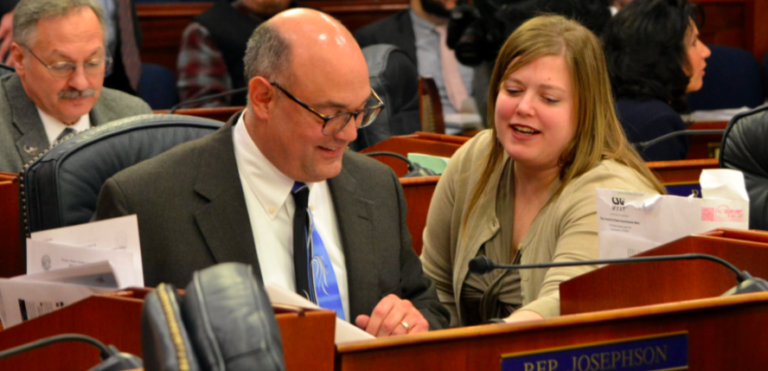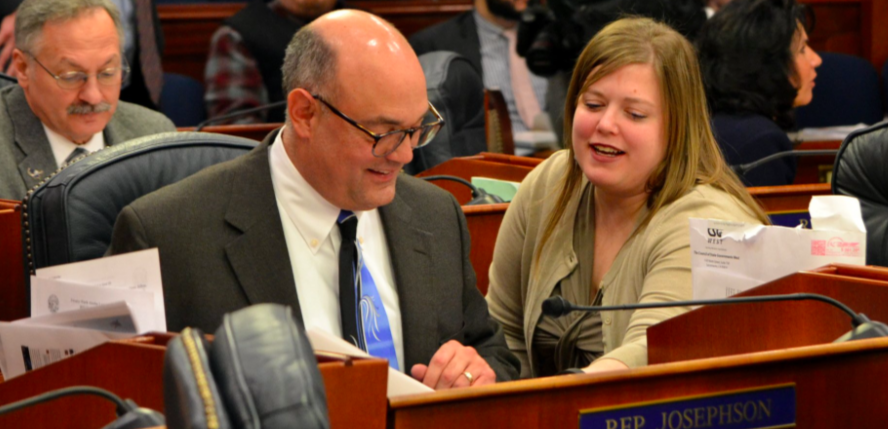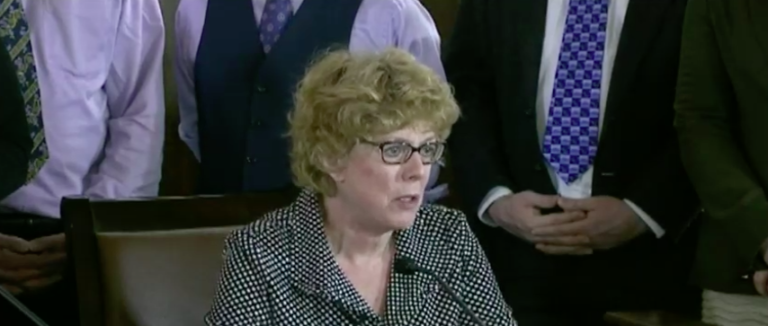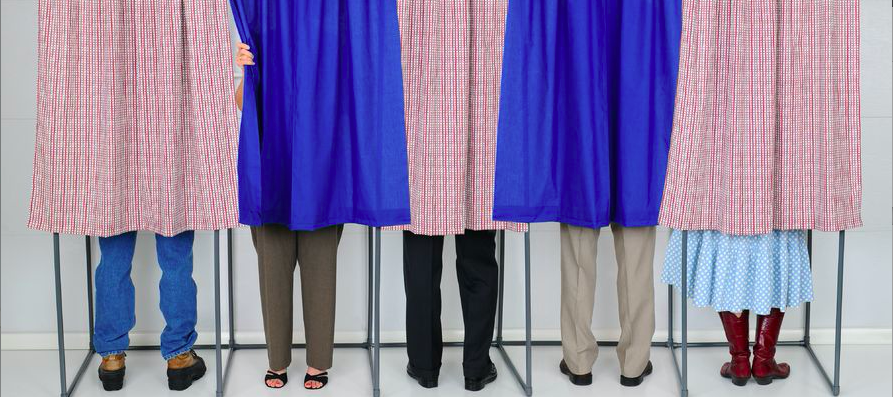
The Alaska House of Representatives, having passed its no-more-cuts budget along caucus lines, turns its attention to other pressing matters this week — hiking oil taxes with HB 111, and taking down the Electoral College with HB 175.
HB 175, which has received scant attention to date, would have Alaska join an interstate compact to award all of its electoral votes to the winner of the national popular vote in a presidential election. The bill is sponsored by Democrat Zach Fansler, with cosponsors Les Gara, Justin Parish, Harriet Drummond, Scott Kawasaki, and Geran Tarr, all Democrats.
It will be heard in House State Affairs Committee on Thursday. It has no fiscal impact on the state budget, except as the presidency can impact the state budget.
The interstate compact among participating states would go into effect after there are enough states to represent an absolute majority of votes, which is currently enough states to equal 270 Electoral College votes.
If passed, in the next presidential election, the joining states would award all of their electoral votes to the electors associated with the candidate winning the popular vote across all 50 states and the District of Columbia. In other words, if Hillary Clinton won the popular vote across all states, the compact members would award all their electoral votes to her.
In this way, the winner of the popular vote nationally would always win the presidency, because he or she would gain the majority of the Electoral College votes.
The “mob rule states” would be breaking-and-entering through the backdoor of the U.S. Constitution, Article II, Section 1, Clause 2, which lines out the rules by which the Electoral College operates.
The Constitution allows legislatures to choose how their states allocate electors. Currently, Alaska awards all of its votes to the candidate who wins the most votes statewide. This is how it is done in every state but Maine and Nebraska, which award them in a split fashion.
Today, Alaska has a House majority run by Democrats, and they are using it to their advantage to push through legislation that they feel will be favorable to Democrats in the next election — 2020.
Current signatories to the compact are the heavily Democrat majority states of California, District of Columbia, Hawaii, Illinois, Maryland, Massachusetts, New Jersey, New York, Rhode Island, Vermont, and Washington.
Unsurprisingly, Hillary Clinton won all those states’ popular votes:
- California: 61.6 percent
- District of Columbia: 92.8 percent
- Hawaii: 62.3 percent
- Illinois: 54.3 percent
- Maryland: 60.5 percent
- Massachusetts: 60.8 percent
- New Jersey: 55 percent
- New York: 58.8 percent
- Rhode Island: 55.4 percent
- Vermont: 61.1 percent
- Washington: 54.4 percent
In Alaska, Donald Trump won 51.3 [corrected 03.24.17] percent of the vote. With HB 175, our votes would be awarded to Hillary Clinton.
WHY THE ELECTORAL COLLEGE MATTERS
The authors of the U.S. Constitution invented a system of Electoral College voting, in order to protect the rights of minority states like, for instance, Alaska, which has a small population. They rejected the simple majority vote because they are prone toward dictatorships and mob rule.
The system was designed by James Madison to protect citizens from the tyranny of direct democracy, where citizens could band together to form an absolute majority, and then strip the rights from the minority.
In Federalist Paper Number 10, Madison describes how, “By a faction, I understand a number of citizens, whether amounting to a majority or a minority of the whole, who are united and actuated by some common impulse of passion, or of interest, adverse to the rights of other citizens, or to the permanent and aggregate interests of the community.”
Madison wrote that “a well-constructed Union” must “break and control … the superior force of an…overbearing majority.”
Protecting smaller, less populous states from being overpowered by larger states was an equally strong concern at the time, which led to the Connecticut Compromise at the Founding Fathers’ Constitutional Convention of 1787. It established a bicameral — or two-body — Congress that allocated members of the House of Representatives according to population but allocated Senators in equal numbers (two per state).
Madison’s electoral college simply extended the Connecticut Compromise to the election of presidents. Electoral votes are awarded by total House and Senate seats combined, thus guaranteeing small states like Alaska a meaningful say in presidential elections. This stroke of remarkable statesmanship has protected small states from the tyranny of large states since the birth of the nation.
There are 538 electoral votes available, and it takes 270 to win the presidency. Some liken the process to the World Series: It’s not the overall number of runs that wins the series, but the team that wins the most games. A team could technically score more runs throughout a series and still lose the series.
(We are not an accomplished student of baseball, but that happened in the 1960 World Series, where the Pittsburgh Pirates won over the New York Yankees. The Yankees won three blowout games (16–3, 10–0, and 12–0), but the Pirates won four games (6–4, 3–2, 5–2, and 10–9).
In U.S. election history, five presidents have won the Electoral College without winning the popular vote:
- John Quincy Adams, 1824
- Rutherford B. Hayes, 1876
- Benjamin Harrison, 1888
- George W. Bush, 2000
- 2016, Donald Trump
Today, with our nation’s cities heavily populated by racial minorities, the Electoral College makes sense as never before, as it actually gives minorities a bit of an edge. They influence the entire electoral vote of their states.
House State Affairs will hear HB 175 during its March 23 meeting at 3 pm in Room 120 of the Capitol. The meeting will be teleconferenced. Four Democrat majority caucus members dominate the committee — Chairman Jonathan Kreiss-Tomkins, Gabrielle LeDoux, Chris Tuck, and Adam Wool. Republicans Chris Birch, DeLena Johnson, and Gary Knopp round out the committee.
As a clear case of “elections have consequences,” Alaska students of the Constitution should watch this legislation carefully.
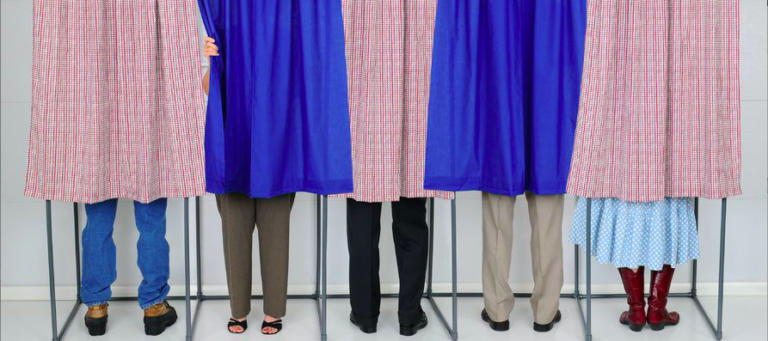






 City Manager Rorie Watt referred to the “peculiar needs” of Juneau and stated “I don’t think we’re ready for Uber.” Assemblyman Jesse Kiehl expressed safety concerns about ridesharing services.
City Manager Rorie Watt referred to the “peculiar needs” of Juneau and stated “I don’t think we’re ready for Uber.” Assemblyman Jesse Kiehl expressed safety concerns about ridesharing services.